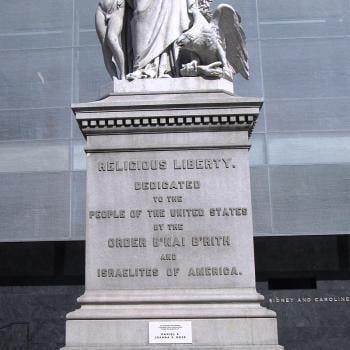Earlier this year, the Pew Research Center's Forum on Religious Life released a broad study titled Mormons in America.[12] This comprehensive look at Latter-day Saints showed that "the overwhelming majority [of Church members] are satisfied in their own lives and content with their communities."[13] Nearly nine out of ten reported being satisfied with their lives.[14] That is higher than the U.S. public generally (75%).[15] Among younger Latter-day Saints, Pew says, the numbers are even greater: "Fully 92% of Mormons under age 50 are satisfied with their lives."[16] Within the Mormon community, those with the highest levels of religious commitment are more satisfied than those with lower levels of religious commitment (91% to 78%).[17]
In their book, Putnam and Campbell note that "the correlation between religiosity and life satisfaction is powerful and robust."[18] Accordingly, by the Pew Center's scale faithful Latter-day Saints rank higher in religiosity than any other group.[19] Nearly seven in ten Mormons (69%) exhibit strong religious commitment—more than any other religious group surveyed and substantially more than the U.S. public generally (30%).[20] Gallup polling research confirms that the religiously devout lead "noticeably happier, more fulfilled lives"[21]; practicing Latter-day Saints appear to be a paradigmatic example of this phenomenon.
Family Values
Studies have shown a sturdy correlation between religious inclination and family-centered values, which put the needs of the spouse, children, and others first.[22] Participation in such values, including family life, contributes to increased personal happiness.[23] Statistics show heavy participation in family life among Latter-day Saints. The U.S. Census Bureau reveals that Utah has the greatest percentage of households headed by married couples in the country, and the highest percentage of homes with children.[24] Furthermore, according to the Pew Center survey, two-thirds (67%) of Mormon adults report being married; a full 15 percent higher than the national average.[25] It is therefore not surprising that the vast majority of Americans equate pro-family values with Latter-day Saints. According to a 2008 survey, nearly nine out of ten Americans (87%) identified Mormons as having strong family values.[26]
For Latter-day Saints the family is theologically paramount. We believe that families can live together forever. An official Church declaration, "The Family: A Proclamation to the World," states that "the family is central to the Creator's plan for the eternal destiny of His children."[27] These teachings influence the most intimate aspirations of faithful Latter-day Saints. Four of five Mormons (81%) say "being a good parent is one of their most important goals in life,"[28] while just 50 percent of the general public says the same. Furthermore, nearly three out of four Mormons (73%) believe that, "having a successful marriage is one of the most important things in life,"[29] compared with 34 percent of the general public.
Education
One prominent scholar recently called Joseph Smith's "insistence upon education"[30] the faith's greatest inheritance. And indeed research confirms that "active, participating Mormons are unusual in their level of educational attainment."[31] This appears to hold true in places outside of the United States. In fact, in areas such as Mexico, where the comparison standard is post-primary rather than college experience, Church members exceed the national rate by a factor of two.[32]
Latter-day Saint holy writ declares that the "glory of God is intelligence"[33] and teaches that "if a person gains more knowledge and intelligence in this life through his diligence and obedience . . . he will have so much the advantage in the world to come."[34] These doctrines have a profound impact. While many today perceive educational attainment as something that diminishes faith, various studies confirm that the more education a Latter-day Saintobtains, the more likely she or he will be actively involved in the Church. The Pew Center's survey indicated that this phenomenon is unique to Latter-day Saints.[35] The study noted that "Mormons who have graduated from college display the highest levels of religious commitment (84%) followed by those with some college education (75%)." Church members with a high school education or less exhibited substantially lower levels of religious commitment (50%) on this scale.[36]
In addition to encouraging participation in normal educational channels, the Church provides a multifaceted program of religious education that begins in the home and is bolstered through programs that support the individual's and family's learning.
Along with weekly Sunday School for all ages, our young people attend something we call early-morning seminary. Before regular school begins, many Mormon teens attend an hour-long class where they study the Holy Bible and other scriptures and Church history. Similarly, university-level students attend religious institute classes that complement post-secondary education. These and other personal studies have a cumulative effect. For example, in one recent survey, Mormons were the most knowledgeable about Christianity and the Bible and were third only to atheists and Jewish participants in knowledge about other world religions.[37]




